- Home
- Priscilla Royal
Justice for the Damned Page 14
Justice for the Damned Read online
Page 14
Some movement or shifting shadow caught the corner of his eye and he turned toward it. Must have been his imagination, he thought. If the boys had returned, surely they would have betrayed themselves by now with the uncontrollable laughter of mischievous youth.
“Come forth!” he ordered nonetheless, hoping his voice expressed admonition mixed with just the right amount of forgiveness.
Nothing.
“It will be better for you if you come now. No damage has been done and thus no sin committed!”
Nothing.
The hairs on the back of his neck rose. Could the ghost of Queen Elfrida have entered the room? Nonsense, he thought. He had only felt a chill draught from the open door. Spring may have come, but didn’t that night air still nip at aged spines?
He shook off the feeling and glanced around the area near Jerome’s work place. Something was different, he realized, and then he gasped.
The Amesbury Psalter was lying on the floor.
Surely he had not left this precious work out! He rushed to pick it up, praying that no damage had been done, begging God’s forgiveness for being so forgetful, so careless.
As the monk bent to retrieve the Psalter, he heard a sound and raised his head.
He screamed only once.
Chapter Twenty-Two
The young novice, who had brought the news of Brother Baeda’s death, trembled as if facing God Himself. Those who knew Sister Beatrice understood why.
“No ghost could have done this deed. How dare anyone suggest that conclusion to me?”
“He is just a boy,” Eleanor whispered to her aunt. “Let him tell his tale.”
Beatrice sighed. “Forgive me, lad.” She closed her eyes and muttered a calming prayer. “Repeat your story, and I shall not interrupt again. Truly, you need not fear my anger nor shall I blame you for the thoughts and words of others. Be assured that I do know the difference between the message and a messenger’s belief.”
The lad swallowed. “Brother Jerome heard the scream and rushed to the library.” His adolescent voice rose to boyish soprano, then cracked into a baritone before falling into nervous silence.
“And did he say why he was so near?” Eleanor’s tone was gentle, not only for the sake of the boy but her aunt as well. Sister Beatrice might be silent, but the prioress knew from experience that the novice mistress was probably grinding her teeth.
“My lady, I should not…” The novice was sweating.
“Sister Beatrice has promised that you will not be blamed for anything you say.” Eleanor gestured toward the novice mistress. “This murder is a grave matter, and it is a man’s duty to tell what he knows of such a vile deed, even if the facts reek with the terrifying stink of the Devil’s work.” The sharp odor drifting from the quivering novice enhanced the image. “I can see a man’s courage in your eyes so do not let your fear of frightening us keep you from frank speech. We may be women but, as leaders in this Order, God graces us with the strength of the Queen of Heaven herself.”
“Well said, my lady,” Beatrice said, her eyes shining with delight. Pride may harden most hearts into insensate things, but a woman’s sin, looking at her child, is a softer one.
The novice straightened his back and pulled in his chin. “Brother Jerome said he was on his way to the library after prayer because...” His face turned scarlet with embarrassment but he went on with only a brief hesitation. “…because he was afraid one of us would return to eke out more vengeance on his work after he revealed we had cast ink on his image of Eden.”
Beatrice’s lips twitched as she glanced at her niece. The story had given the two a merry moment.
“Continue,” Eleanor said, hoping her expression suggested encouragement, not the amusement she felt.
“Brother Jerome thought someone had been injured when he heard the cry so he shouted that help was coming. As he approached the building, he saw a monstrous black shape hovering about the door. The creature had no face, only eyes licked by flames.” The boy gulped. “Then the stench of Hell struck his nostrils, and he felt his soul grow weak. Quickly he prayed for God’s protection from the great Fiend. It was this timely plea, he says, that must have saved him from Brother Baeda’s fate. Although he immediately lost all consciousness, he soon awoke, still in this world and lying on the ground. The damned soul was gone. My lady, I beg pardon for saying so, but Brother Jerome claims the creature matched all descriptions of the ghost. Although he had never seen any mortal man quite so huge, he believed it wore a woman’s robes. I only repeat…” The boy fell to his knees, shaking like a lone leaf in winter’s first storm.
Beatrice spread her arms as if to hug the boy. “Like a man, you have bravely reported the events, and I thank you for that. Fear not. I do bark but rarely bite—or at least rarely bite the innocent. Go to the kitchen and ask for ale and cheese on my orders.” She shook her head. “You need filling out, lad. You could pass for a ghost yourself.”
The boy stumbled to his feet and ran as if afraid the novice mistress might change her mind and chew on him despite her words to the contrary. He was in such a rush that he would have knocked over Sister Anne as she entered the room if Brother Thomas had not been immediately behind her.
“Two people of calm and reason,” Beatrice sighed to her niece. “Are we not grateful after the tales we have just heard?”
“Did the poor corpse provide any hints to the cause of his death?” Eleanor asked.
“A sad sight,” Anne replied. “He was choked with such strength that the cord was still embedded in his neck. We left the body in the infirmary where Brother Jerome is now praying for his soul.”
“Our librarian was a modest man in life.” Beatrice’s voice was edged with weariness. “God will surely keep his spirit but little time in Purgatory.”
“This second murder should not have happened.” Eleanor’s grey eyes turned to an ashen dark as she looked at her aunt. “I have failed you.”
“Cast those thoughts from your mind now.”
“But I…”
“Hear me out on this. Our priory has only the wits God gave us to bring the vile murderer of these men to justice. As I did after Wulfstan’s death, I will send word to the sheriff. As he did then, he will insist that ghosts are outside his authority, especially one that kills within a priory, and his hunting companions will hear much about our presumption in troubling him with this matter!”
“But I am doing…”
“…more than he. At least you and Brother Thomas are asking questions while Sister Anne brings her knowledge and acute observations to our aid.” She glanced at Thomas. “Now is the time to tell us what more you have discovered.”
The monk repeated the gist of his conversations with Mistress Drifa and Master Bernard, although he continued to omit what he had heard from the dead librarian about the roofer’s interest in the Psalter.
“So it would seem that Sayer, our man of many talents, is a possible suspect?” Beatrice raised a cautioning finger. “I am not condemning Wulfstan’s son on such weak evidence, but that is more than the representative of King Henry’s justice would have discovered even if he had bothered to try. Let us see where our combined knowledge might lead us.”
“Did you find anything else of note when you examined the librarian’s body?” Eleanor asked Anne.
“Nothing on the body itself, my lady, but the position of the corpse might be of interest. The body was lying on top of a Psalter, a most magnificent work if I can judge from the depiction of Jacob’s dream that lay open.”
“That could only be the one sent by Prioress Ida for repair,” Beatrice suggested. “We have no others with such remarkable images.”
“That was what Brother Jerome said. He was quite distraught when he saw it under the corpse but waited until I was done to see if the work had suffered damage.”
“Brother Jerome waited? A minor miracle,” Beatrice muttered.
“From the way his body lay
, the librarian was kneeling or bending over when he died. I could not tell if he had been holding the Psalter, and then dropped it, or was retrieving it from the floor when the killer struck.”
Thomas’ eyes narrowed. “Was the Psalter damaged?”
“Apparently not. When he examined it, Brother Jerome expressed relief that there were no bloodstains.”
“I find it odd that the Psalter was not stored safely away until the monk came to do repairs,” Beatrice said.
Thomas cleared his throat. “I might be at fault for that, Sister. When I came to give an account of my evening at the inn, Brother Porter told me that Prioress Eleanor had left the priory. Since I had heard your monks speak of this wondrous Psalter, I went to the library to see it. Brother Baeda was kind enough to show me the work.”
Eleanor frowned. “Yet you and I met together later in the afternoon. There was time to put the Psalter in the manuscript chest afterward. Had Brother Baeda grown so careless about the works under his care? I remember him as a most meticulous man.”
“He had not changed. Our brother loved the books like a father might his children.” Beatrice turned with a wry smile to Thomas. “He must have been pleased at your unexpected interest.”
Thomas met her gaze. For a moment they studied each other, and then he nodded as if conceding some private debate. “The Psalter was open on the table when I entered the library. Brother Baeda mentioned that word of its presence there must have spread, for I was the second to beg leave to see the book of late. Perhaps a third came later, and the brother did not have time to return the treasure to a less public place.”
“Or else the first returned?” Eleanor suggested. “Who was this person?”
Thomas looked down at the floor and worried the rushes with his foot. “Sayer.”
“Did Brother Baeda say what sort of interest our roofer showed?” Beatrice asked.
“Sayer expressed delight with the work itself and asked how such a valuable item was stored to protect it from accidental damage.”
“Wulfstan’s son showed a most commendable concern for the safety of our holy works.” Beatrice’s eyes revealed no shaded meaning in that simple statement.
“A worry that I share,” Eleanor cried out. “Dearest Aunt, I know you believe Sayer to be a harmless rogue, but the direction of all we have learned deeply troubles me. May I have permission to present my concerns?”
“I wish to hear them.”
“We know that man led weak-fleshed monks into sin for coin. His own father had ties to lawless men when he himself was younger.” She turned toward Thomas and Anne. “Today, my aunt and I saw toeholds in the wall Prioress Ida had asked Wulfstan to repair, gouges in the mortar that would allow someone to enter and exit this priory. Even if he was innocent of that foul treachery, someone who helped him was not. I must ask if Sayer was his assistant.”
“A question easily and soon answered. Please continue, my child.”
“A moment ago, we learned that this son, who has followed his father’s example of dishonest behavior, asked pointed questions about this priory’s treasured Psalter. Soon after, an unknown is seen escaping from the library after slaying a monk, the body found lying on this same book. Why was the killer there? Might these violent deeds be related in some way to the Psalter? Theft of relics and fine works done in God’s name is not unusual. Maybe Sayer and his father found a way to benefit from the theft of this manuscript, quarreled over some detail, and the son killed his father as he publicly threatened he would? Now he has killed Brother Baeda who happened upon him while he was attempting to take the Psalter.”
Thomas’ face turned a dark red. “You have observed well, my lady, and I cannot dispute your conclusion that Sayer might have killed the monk in a botched attempt to steal the Psalter. Yet I cannot believe he killed his own father, despite the argument at the inn and his drunken threats.”
“Sayer may have had minor differences with his father, but that quarrel is the first I have heard that the two might have had a serious disagreement.” Beatrice glanced at Thomas before turning again to her niece. “The idea about a planned theft of our manuscript is most interesting, however.”
“You know more of both men than I, Aunt, and understand the world far better. I beg you to show me where I have erred.”
“In nothing, I fear. Yet neither Wulfstan nor Sayer has ever been a brutish maen. The father was not alone in hungering after another man’s fat purse, then joining with friends to equally distribute such wealth.” No mirth lightened the novice mistress’ laugh. “Do not mistake my meaning in this. A crime was committed, but merchants lost money, not their lives. And, aye, Sayer took advantage of men’s weaknesses for his own profit. Both father and son were disgraceful in their wickedness; nonetheless, neither ever added murder to his wrongdoing. Man may be an evil creature by nature, but each mortal has his special vice. Sayer’s has never been bloodshed, although theft of a Psalter might not be beyond him.”
“Sayer’s mother speaks well of him,” Thomas said softly.
“As did his cousin, Alys,” Eleanor conceded.
“Although many might argue against me on this, I am not so sure we ought to ignore the faith of an innocent girl or the testimony of a mother.” Beatrice turned to Anne. “I say this as a woman beyond the age when illusions are common.”
Anne chuckled. “I might have said a woman who had not yet reached those years when she is like to paint the past with the softer colors of delusion.”
“You flatter me, Sister. Yet I fear Sayer is involved in this matter even if I question his role as a killer.”
“If Sayer and his father plotted the theft of the Psalter and argued about it for some reason, the killing might have come about by accident,” Eleanor suggested.
Thomas turned to Beatrice, his hands extended as if pleading with her to agree. “I found Mistress Drifa creditable when she said the quarrel would have been of little consequence had Wulfstan lived. She is not ignorant of her loved ones’ wrongdoings, no matter how much she might despise the deeds. Could such a crime as this theft have seemed a petty thing to an honest woman? That said, I suspected that she was hiding something, something she avoided telling me. Whatever that might be, however, I cannot believe it was murder.”
The novice mistress agreed. “Rogue the lad may be, a corruptor of those who long to be seduced and mayhap a thief, but he has always been a gentle man, willing to help the sad recover laughter with merry jests. That is not a man who kills with the cruelty we have seen here.”
Thomas bent his head in concurrence.
“Do we agree that Sayer is most likely implicated in some way, even if we hold doubt that he slew Wulfstan or Brother Baeda?” Eleanor looked around at her companions.
They all nodded.
She went on. “Unless we give credence to ghosts or believe that chance murder has suddenly become the custom here, we must recognize that the killings share a common element. That is the roofer.”
“My lady…”
Eleanor held up her hand at Thomas’ mild protest. “Do not misunderstand me. I am not condemning, but I would be remiss if I did not note the connections. Sayer’s father was in charge of repairing the wall, a flawed mending that allowed continued access to the priory. Wulfstan is stabbed and beheaded near the very place. Sayer asks questions about the Psalter. Soon after, Brother Baeda is throttled with a cord in the library.”
“When we met at the inn, Sayer was surprised that I had found a way out of the priory. His reaction may prove he was not the one who left the toeholds in the wall,” Thomas said.
“Or else he was amazed that you discovered his covert path, Brother,” Anne replied.
“If that was true, he could have killed me to preserve the secret after I left the inn,” Thomas protested. His face fell. “Or might have done so if he had not passed out from drink.”
Eleanor leaned toward her aunt. “Is it possible that someone from within the prior
y is the culprit?”
“Not of our librarian’s death at least. Although Brother Jerome is often too full of righteous zeal, I am grateful that he chose this time to note those present at the Evening Office,” Beatrice said. “Only Brother Baeda failed to be there and no one could have left the chapel in time to kill the poor man. If the monks are innocent of that, I cannot imagine any were guilty of Wulfstan’s killing.”
Eleanor looked over at Thomas. “And you believe that Sayer is an unlikely father killer?”
“I do,” the monk murmured.
“I find it hard to believe that Wulfstan wanted to steal our Psalter.” Beatrice shook her head. “He had honored the king’s law for so many years.”
“Since the birth of his third child.” Thomas spoke so softly he might have been talking to himself.
“Unless he learned of his son’s plot and wanted to share some of the profit,” Anne suggested.
“There is something else to consider.” Eleanor reached out and touched her aunt’s sleeve. “I do not believe in ghosts any more than you, but we cannot deny that Wulfstan saw something before his death and was most frightened of it. Might this alleged ghost have been Sayer playing a prank?”
“A man in a woman’s dress? That is most unusual.” Beatrice glanced at the faces around her. “Very well, it is possible and has been done, but surely the father would have recognized his oldest son. The man was shaking when he told me about the sighting that morning. His rank sweat is not easily faked.”
“Unless he was so convinced because of the tales that it was the ghost he failed to see a familiar face,” Anne added. “Fear plays an imp’s tricks with mortal eyes.”
“We are circling problems but finding no solutions.” Eleanor turned to her aunt. “I beg approval…”
“Do what is needed,” the novice mistress replied. “We will get no assistance from the secular world.”
“Brother Thomas, you are the best one to find Sayer and question him. If the man has not fled, he may be innocent, yet have something to tell us about the wall, the manuscript, and his father that will bring clarity to everything. For your own safety, do this only in a public place and with much caution. If he is not a killer but is guilty of some other crime, we can offer mercy…”

 The Twice-Hanged Man
The Twice-Hanged Man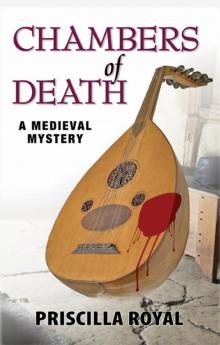 Chambers of Death mm-6
Chambers of Death mm-6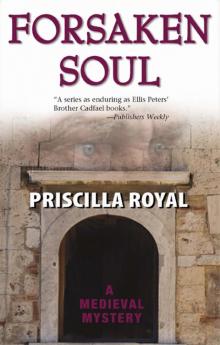 Forsaken Soul
Forsaken Soul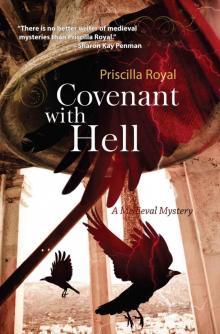 Covenant With Hell (Medieval Mysteries)
Covenant With Hell (Medieval Mysteries)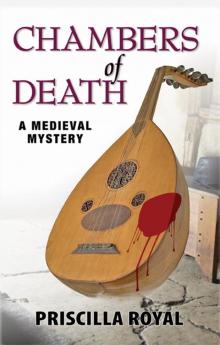 Chambers of Death
Chambers of Death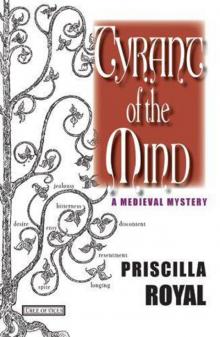 Tyrant of the Mind
Tyrant of the Mind Wild Justice
Wild Justice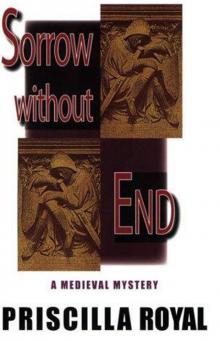 Sorrow Without End
Sorrow Without End Wine of Violence
Wine of Violence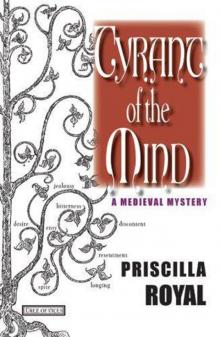 Tyrant of the Mind mm-2
Tyrant of the Mind mm-2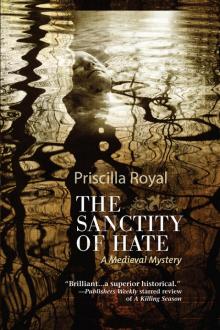 The Sanctity of Hate
The Sanctity of Hate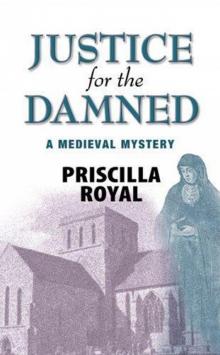 Justice for the Damned
Justice for the Damned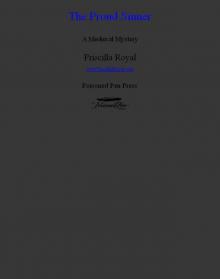 The Proud Sinner
The Proud Sinner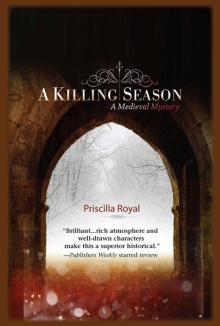 A Killing Season mm-8
A Killing Season mm-8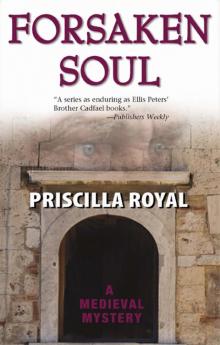 Forsaken Soul mm-5
Forsaken Soul mm-5 Valley of Dry Bones mm-7
Valley of Dry Bones mm-7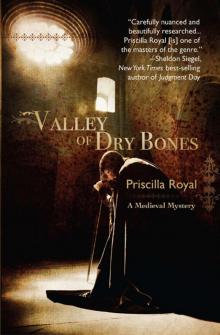 Valley of Dry Bones
Valley of Dry Bones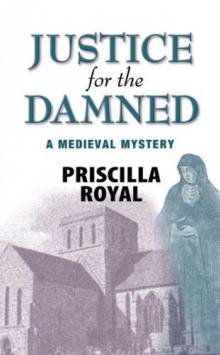 Justice for the Damned mm-4
Justice for the Damned mm-4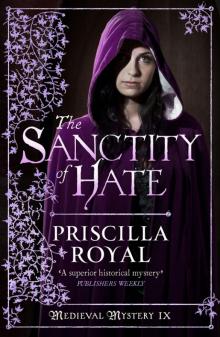 Sanctity of Hate
Sanctity of Hate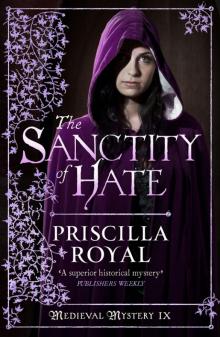 Sanctity of Hate mm-9
Sanctity of Hate mm-9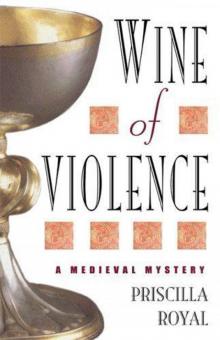 Wine of Violence mm-1
Wine of Violence mm-1